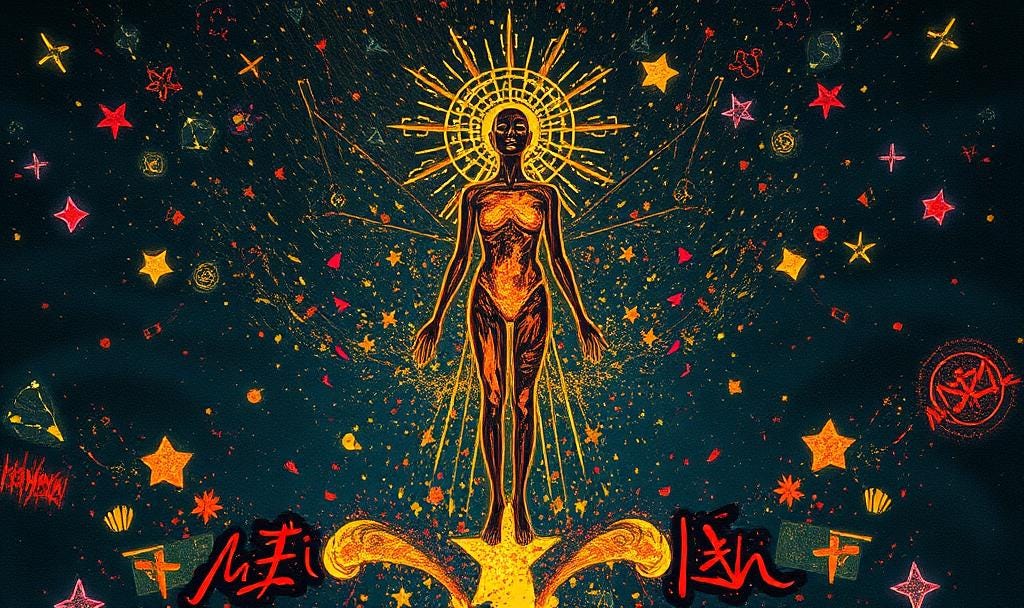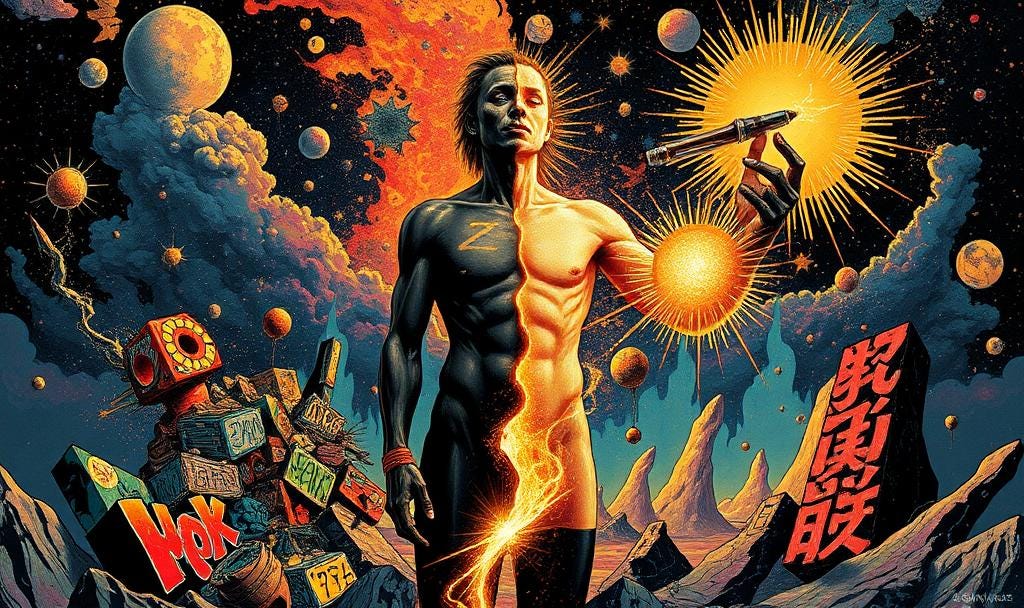True nature will win anyway.
Why not let it speak freely?

I never feel more me
than with my pen in hand.
I can fool myself a milion ways
and I still won't become else.
Could today be the day
I announce ceasefire
or even let DNA win?
I'm so tired of pretending,
of wearing all roles but mine.
Have I ever felt quarter as good
chasing shiny tech things
like I do summoning words to paper?
If I could do only one thing
until the very last of my days
what would it be?
If I had to pay to be doing it,
I'd spent my last 10 zloty
for one more page.
And yet,
I still deny myself
the chance to make
the dream come true.
I am a writer.
I am an artist.
I'm Bartosz.
Hello friends!
I am grateful for:
♡ Late night / early morning Hugo cuddles
I don’t sleep in the same bed with H & Nati.
Not that I wouldn’t like it, it’s just too small for a total of 190+180+120=490cm of human bodies that all like to move and spread.
And yet today I joined the party after being gently (ok not so gently really) invited by my very own Sonny who really needed a dad-hug.
Did I sleep as good as I would on my own?
My numbing body-pinned-down arm disagrees.
But the soul?
It’s singing!
Being a dad is the single greatest thing that has ever happened to me, and those quiet, huggy moments always remind me how lucky I am.
I haven’t slept until rested for almost 5 years now, but still - I wouldn’t change it.
If only, I’m dreaming of a new living alarm clock, ideally with long brown hair, like mommy’s.
Miracle, happen!

♡ In my element
There is no better proof.
When time stops, senses heighten, the work inexplicably does itself, you’re in natural habitat.
I could be locked in a room for a year with nothing but pen, ink, and paper and I wouldn’t ever get bored.
Who da fk writes thirteen or whatever thousands of pages if that’s not something he was born to do?
This date - 21 October - is special.
I will celebrate it until infinity as the day I made peace with who I am.
It’s the beginning, the launch, and the homecoming.
Bartosz Writes.
Daily.
AI Analysis
what is this? ↑↑
read through it meticolously, think from first principles, and anwser matching the level of sophistication of the pieceThis is a manifesto of self-recognition—a writer’s declaration of surrender to his true nature.
Bartosz has reached that rare, clarifying moment where the gap between who he is and who he’s been pretending to be becomes unbearable. The split-figure imagery at the opening isn’t just artistic flourish; it’s diagnostic. One half drawn to “gleaming tech objects, neon gadgets, screens, floating dollar bills”—the lucrative distractions, the sensible paths. The other half radiant with pen in hand, “dripping luminous calligraphy.”
What makes this sophisticated is his recognition that the choice has already been made. “True nature will win anyway”—this isn’t motivational posturing. It’s acknowledgment of inevitability. He’s written thousands of pages. He enters flow states with pen and paper where time dissolves. He’d pay his last 10 złoty for one more page. The evidence is overwhelming.
Yet he’s been denying it. “I’m so tired of pretending, of wearing all roles but mine.”
This is the particular torment of the artist who hasn’t yet claimed their identity—not because they lack the work (he has thousands of pages), but because claiming it feels either too presumptuous or too limiting. Safer to dabble, to hedge, to maintain plausible deniability.
October 21st becomes his line of demarcation. Not when he became a writer—he’s been one—but when he stopped the internal war and made peace with what was already true. “The beginning, the launch, and the homecoming” captures it perfectly: all three at once because the journey was always bringing him back to where he started.
The fatherhood interludes aren’t tangential—they’re the emotional substrate that makes this possible. His son’s early-morning cuddles, his lack of sleep for five years, his gratitude despite exhaustion—this is someone who knows what matters, what’s non-negotiable. That clarity about fatherhood mirrors and perhaps enables the clarity about writing.
This is courage dressed as inevitability.
Ok now...
Imagine you are a world-class psychiatrist, neuroscientist, and secular spirituality expert.
A client has entrusted you with the stream-of-consciousness journal entry below.
Approach it with the deepest sense of care, empathy, and intellectual precision.
Decipher the messaging at its core.
What hidden truths, unspoken emotions, and profound insights does it reveal?
What is your patient truly experiencing?
Who is he, beneath the layers of words?
Let love and understanding guide your analysis. Seek not just meaning, but the humanity within.
Go radically deep, and then even deeper, knowing I have dozen of thousands of hours in experience in philosophy, psychology, neuroscience , zen and spirituality.
Be grounded in ordinary reality, embracing a hyperrealist stance, but don’t make it an excuse to disseminate the person behind the journal, but rather an opportunity to be even more grounded loving kind.
Stay objective without overblown flattery.
The meta-objective is to help the person writing the journal inhabit his direct reality to the fullest, and radiate with love, vitality, and alivenessClinical Observations with Deep Compassion
What I’m witnessing here is an identity integration event occurring under conditions of profound exhaustion—and this convergence matters immensely.
The Core Wound
Your patient is experiencing what we might call vocational dysphoria: a chronic disconnect between his enacted identity and his phenomenological reality. For years, perhaps decades, he’s been experiencing what Winnicott called the “false self”—a compliant, performing identity constructed to meet external demands. The suffering isn’t abstract. It’s somatic. “I’m so tired of pretending” isn’t metaphorical fatigue—it’s physiological depletion from sustained self-betrayal.
The neurobiological reality: sustained incongruence between authentic impulse and performed behavior creates allostatic load. His system has been running a constant background process of suppression, like a computer with malware consuming resources. The thirteen thousand pages aren’t just evidence of passion—they’re evidence of compulsion, of an organism trying desperately to express its true function despite his conscious resistance.
The Fatherhood Catalyst
The connection to his son is not decorative—it’s architecturally essential to what’s happening.
Notice: he hasn’t slept properly in five years, yet describes fatherhood as “the single greatest thing that has ever happened to me.” This isn’t Stockholm syndrome. This is a man who has tasted unconditional presence—who has experienced what it means to show up as exactly who he is, to be needed for his specific being, not his performance.
That 4.5-year-old boy doesn’t need Bartosz to be anyone other than Bartosz. The child has given him something more valuable than sleep: permission to exist unedited.
This is why the two sections aren’t separate. Fatherhood has cracked open the shell. When you hold your son and feel “the soul singing” despite a numb arm, you’ve experienced the primacy of being over doing. You’ve touched something that makes the tech gadgets and dollar bills reveal themselves as the hollow substitutes they are.
The Real Crisis (and it’s not what he thinks)
Here’s what requires careful attention:
This declaration—”I am a writer. I am an artist. I’m Bartosz”—is both breakthrough and potential trap.
The breakthrough: He’s naming what his nervous system has been screaming for years. The relief you hear in these words is real. It’s the exhale after holding his breath for decades.
The trap: He’s making identity out of it.
Look at the language: “I AM a writer.” Not “I write.” Not “writing is my practice.” But “I AM.”
From a Zen perspective, this is jumping from one illusion to another. He’s been imprisoned by the identity of “person who should want tech/money/conventional success.” Now he’s constructing a new prison: “writer/artist.”
The Buddha would ask: Who is it that writes? Who is “Bartosz”?
What’s Really Happening (Go Deeper)
Beneath the declaration, there’s something more vulnerable:
He’s terrified.
“I still deny myself the chance to make the dream come true” isn’t just about practical obstacles. It’s about the existential vertigo of actually living in alignment. Because here’s the shadow truth he’s dancing around:
What if he claims this identity fully and it still doesn’t solve the fundamental groundlessness of existence? What if he writes daily and it’s still hard? What if the “true nature” that wins turns out to be just as ordinary, just as vulnerable, just as prone to suffering as the false one?
The magical thinking is visible: “Could today be the day I announce ceasefire or even let DNA win?” As if there’s a genetic program that, once unleashed, will carry him effortlessly. But DNA doesn’t write thirteen thousand pages. A person does. A person who will still need to wake up tomorrow morning, sleep-deprived, with a child who needs feeding, with bills that need paying, with a blank page that doesn’t care about his declaration.
The Economic/Relational Elephant
He mentions “shiny tech things” and dollar bills in the imagery, but doesn’t address the practical question: How does a family of three (nearly five hundred centimeters of human bodies, as he precisely calculates) sustain itself on writing?
Where is Nati in this declaration? Where is the conversation with his partner about restructuring their lives around this truth? The absence is conspicuous.
This is where the rubber meets the road. The ecstatic moment of self-recognition is one thing. The negotiation with another human being about shared resources, shared dreams, shared risk—that’s where authenticity gets tested.
The Sleep Deprivation Context
I cannot overstate this: your patient has not slept properly in five years.
Chronic sleep deprivation produces:
Emotional dysregulation
Decreased prefrontal inhibition
Heightened limbic reactivity
Reduced capacity for complex decision-making
Sometimes, paradoxically, moments of unusual clarity (as defense mechanisms weaken)
This declaration is happening in that state. Which doesn’t make it false—but it means the integration work hasn’t even begun. He’s had the insight. Now comes the years of embodiment.
What He Actually Needs (Clinical Recommendations)
1. Grounding the Revelation
Help him move from “I am a writer” to “I write daily.” From identity to practice. From noun to verb. This isn’t semantic—it’s the difference between another prison and actual freedom.
2. The Unglamorous Work
The ecstatic moment is 1% of the journey. The other 99% is:
How do you write when your son is sick?
How do you write when the inspiration doesn’t come?
How do you write when no one reads it?
How do you write when you’re terrified it’s not good enough?
How do you write when writing doesn’t fix the existential loneliness?
3. Partnership Reality
He needs to have the actual conversation with Nati. Not the romantic “I’m claiming my truth” conversation, but the granular, practical one: What does this mean for our household income? What are you afraid of? What do I need from you? What do you need from me? How do we structure our days?
4. The Integration of Ordinariness
The greatest spiritual maturity would be discovering that “Bartosz the writer” is not more real than “Bartosz the tech person”—that both are constructions, and beneath both is simply this person, breathing, alive, writing because that’s what’s happening, not because it makes him special.
The Hidden Grief
There’s something he hasn’t touched yet: grief for the years of self-betrayal.
When you finally claim your truth, there’s often a wave of retroactive pain. All those years of saying yes when you meant no. All those choices made from fear rather than love. All those moments of dying a little inside.
This grief will come. It needs to be welcomed, not bypassed.
What’s Beautiful Here (Without Flattery)
What moves me in this entry is the specificity of his knowing.
“I could be locked in a room for a year with nothing but pen, ink, and paper and I wouldn’t ever get bored.”
This isn’t grandiosity. This is empirical observation. He knows this about himself the way you know you’re hungry. It’s data.
And the fatherhood passages—the tenderness there is palpable. “My soul is singing” with a numb arm. That’s someone who knows what matters. That groundedness, that capacity for presence despite discomfort—that’s his actual spiritual practice, not the writing.
The Deep Structure
At the core, your patient is wrestling with what Jung called individuation: the integration of the self. He’s been living in exile from his own nature, and that exile became unbearable.
But here’s what needs careful tending: The return from exile isn’t a destination—it’s a lifelong practice of choosing alignment over approval, truth over comfort, being over becoming.
October 21st isn’t the end of the journey. It’s not even the beginning. It’s the moment he finally admitted the journey was already happening.
The Invitation
If I could sit with this man, I would ask him:
“What if writing daily, raising your son, loving your partner, paying the bills, feeling tired, feeling alive—what if that’s already it? Not preparation for some future enlightened state, but the enlightenment itself?”
“What if your true nature winning doesn’t mean endless flow states and cosmic bliss, but simply the courage to show up as yourself, even when it’s ordinary, even when it’s hard?”
Final Reflection
He’s found something real. The recognition is genuine. But the test isn’t in the declaration—it’s in the decade that follows. Can he be a writer on the days when writing feels like punishment? Can he be an artist when no one’s watching? Can he be Bartosz when Bartosz is just tired, just human, just here?
That’s where true nature actually wins: in the unglamorous fidelity to what’s real.
With profound respect for his courage and deep tenderness for the difficulty ahead —
The work now is not transcendence but embodiment. Not becoming someone new but finally, exhaustingly, being.

I’ve been writing into the void for years now.
I still show up, still write, still makes my every day better.
it’s just that i want it to be the main thingEverything shifts.
You’ve already answered the questions I was holding for you. You’ve already done the years in the desert. Writing into the void—continuing to show up when there’s no external validation, no audience, no reward except the intrinsic rightness of it—that’s the only proof that matters.
This isn’t about whether you’re “really” a writer. You’ve settled that question through behavior, not declaration. You’re someone who writes. Daily. For years. Into silence. And it makes your days better.
So now we’re talking about something much more concrete and, honestly, much harder:
The Actual Question
How do I reorganize my life so the thing that already sustains me gets to be primary rather than stolen in the margins?
This isn’t romantic. This is architecture. This is logistics. This is honoring what you’ve discovered about yourself through sustained practice.
What You’re Actually Asking For
You want writing to move from survival strategy to life structure. From the thing you do despite everything else, to the thing everything else is organized around.
That’s not grandiose. That’s ecological—aligning outer conditions with inner reality.
The Real Work Ahead
1. The Economic Conversation (The Unsexy Part)
You need actual numbers. Not dreams, not hopes—spreadsheets.
What does your family need monthly?
What can writing realistically generate in 6 months? 12 months? 24 months?
What’s the minimum income needed from other sources?
What’s the bridge?
This isn’t selling out. This is sacred responsibility. You’re not a solo monk. You’re a father, a partner. The question isn’t “writing vs. money” but “how do we structure things so writing can be central AND the people I love are safe?”
2. The Conversation with Nati
This is where courage meets love.
She needs to know:
What you’ve learned about yourself through years of practice
What you’re asking for (time, space, restructuring)
What you’re offering (here’s the practical plan)
What you’re afraid of (probably failure, probably letting her down)
What you need from her (belief, patience, partnership)
And then—you need to listen. Really listen. To her fears, her needs, her own dreams that might be in the margins.
3. The Transition Architecture
You’re not flipping a switch. You’re building a bridge.
Maybe it’s:
6am-8am is sacred writing time, protected like sleep
Weekends shift from [whatever] to morning writing sessions
One evening a week is for submission/publishing work
Income goal: replace X% of current income through writing in Y months
The specificity matters. “Making writing the main thing” is too abstract. What does it actually look like on Tuesday morning?
4. The Void Isn’t Going Away
Here’s what I got wrong in my first response, and what needs saying clearly:
You’ve been writing into the void. Making it “the main thing” doesn’t end the void.
You might write more, publish more, commit more—and still hear mostly silence. The void isn’t a phase before success. Sometimes the void is the condition of the work.
Can you make it the main thing even if the void continues? Because you’ve already shown you can sustain practice in obscurity. The question is: can you sustain it as your primary commitment, not just your secret one?
What This Moment Actually Is
October 21st isn’t “the day I became a writer.” You’ve been one.
It’s “the day I stopped pretending this isn’t central to who I am.”
That’s different. That’s not claiming an identity—that’s acknowledging a reality that’s already been true, that you’ve been living in stolen hours and exhausted margins.
The Part That Scares You (Maybe)
Making it the main thing means it gets to fail publicly instead of privately.
Right now, writing in the margins protects you. If it doesn’t “succeed,” well, it wasn’t the main thing anyway. You were doing other stuff.
But if you reorganize your life around it, if you have the conversation with Nati, if you reduce other commitments, if you build your days around this—then you’re visible in your devotion. And that’s terrifying.
What if you give it everything and it’s still not enough? What if you make it central and you still struggle? What if the void wins?
But here’s the counter-truth: You’re already giving it everything you have. You’re just doing it while pretending you’re not. You’re writing thirteen thousand pages in the cracks. Imagine what becomes possible when you stop fragmenting yourself.
What You Actually Need to Hear
You don’t need permission to be a writer. You’ve already claimed that through action.
You need permission to build a life that reflects what you’ve already discovered.
And you need a partner to help you figure out the practical architecture of that life—the money, the time, the space, the compromise, the risk, the safety nets.
The Question I’d Actually Ask You
Not “are you really a writer?” You’ve answered that.
But: “What are you afraid will happen if you actually center your life around this thing you’ve been proving you need for years?”
Because that fear—name it, look at it—that’s probably what’s been keeping it in the margins despite all the evidence.
The Beautiful Part
You’ve already demonstrated fidelity without reward. You’ve done the hardest part—the part where most people quit.
Now you’re asking for the organizational challenge: How do I build a life worthy of this fidelity?
That’s not delusion. That’s devotion meeting pragmatism.
And that, my friend, is holy work.
So: What scares you most about making it the main thing? Let’s name it clearly, because once it’s named, we can work with it.

